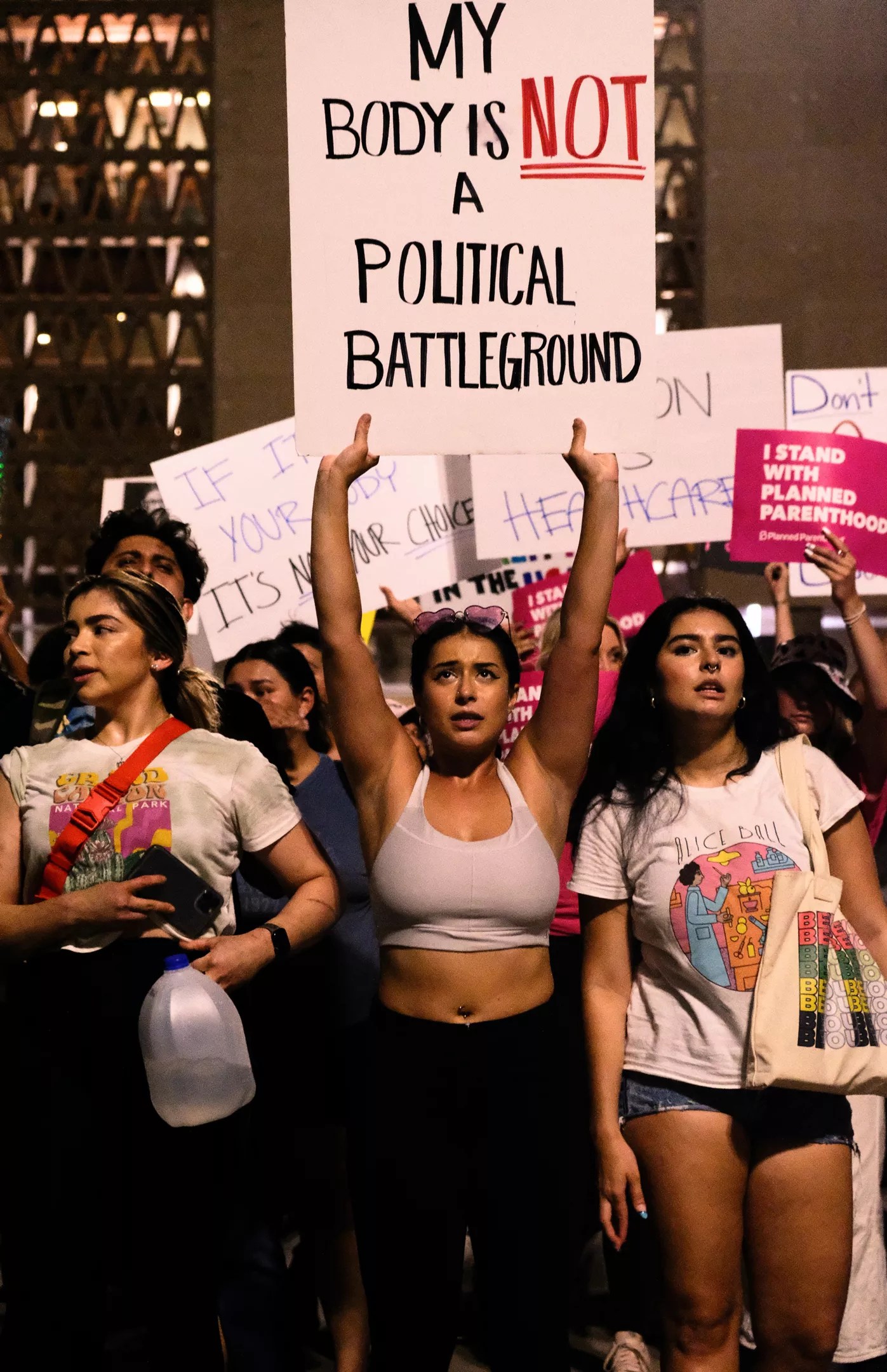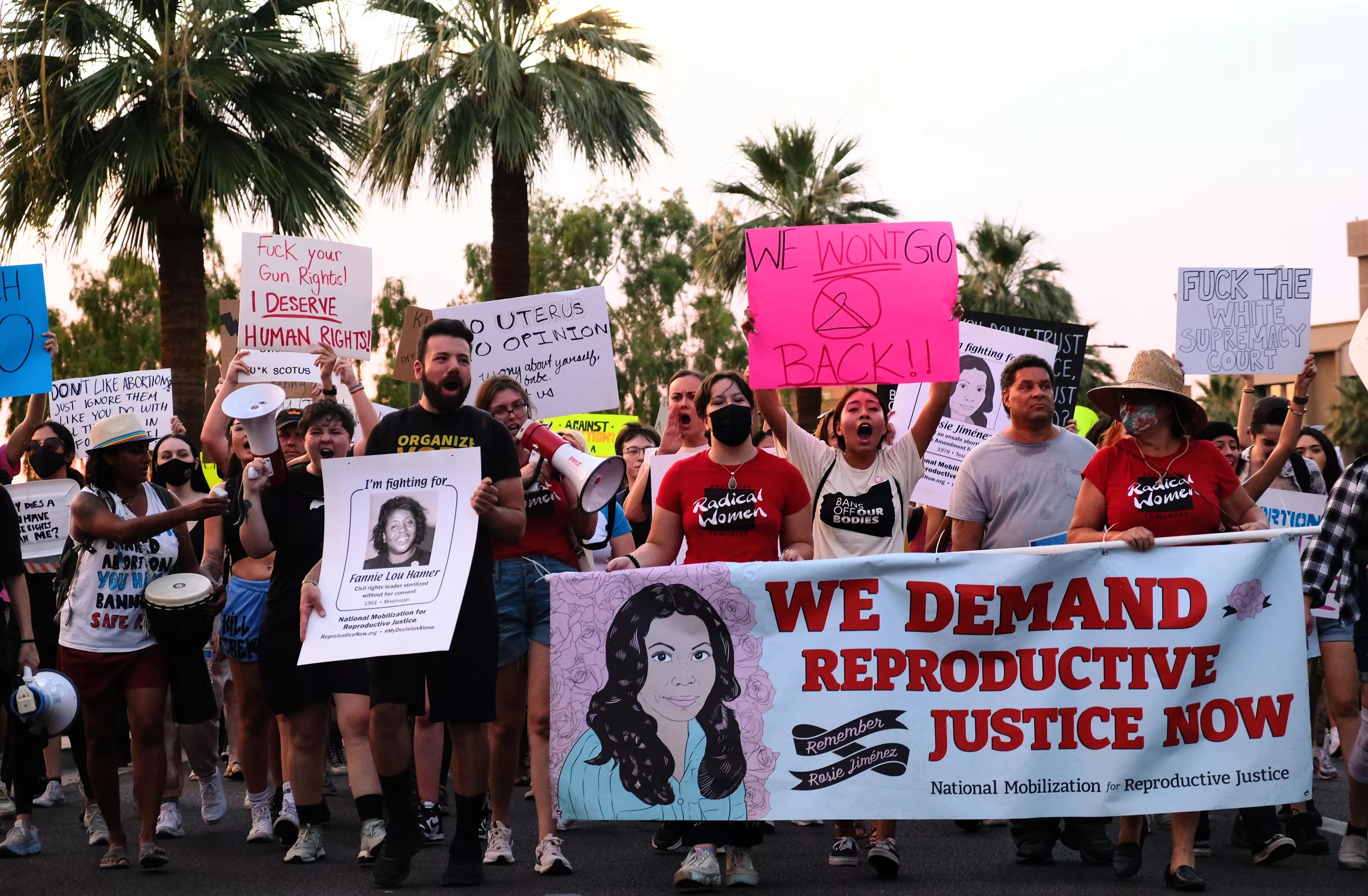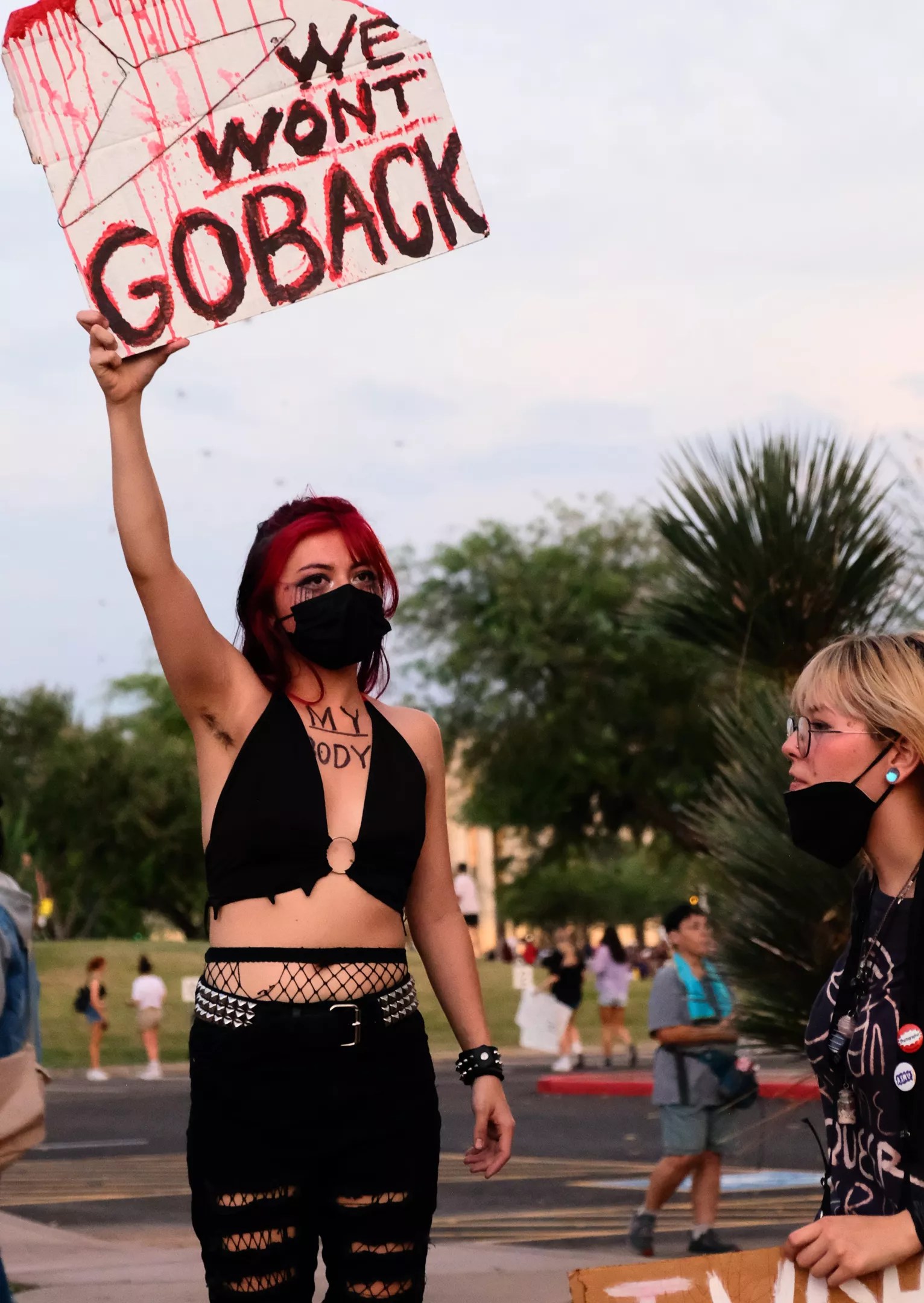
Katya Schwenk

Audio By Carbonatix
Protesters swarmed the Arizona Capitol this weekend to protest the reversal of Roe v. Wade by Friday’s U.S. Supreme Court decision that upended abortion rights overnight across the state. Clinics in Arizona, facing legal uncertainty, had shuttered their doors hours after the landmark ruling.
Arizonans took to the streets on Friday. A crowd of thousands – as many as 8,000, according to some estimates – convened in Phoenix. Most were women; many were in their teens and 20s. They gathered at the Arizona Capitol at sunset, braving 100-degree heat. They marched through the streets, then back toward the Capitol lawns, chanting.
As night fell, protesters assembled in the square outside the Arizona Senate building, where lawmakers were still convening inside. A video taken inside by a senator shows that some demonstrators slammed against the glass doors to the senate building, while others stood near the entrance, chanting and holding signs.
The Arizona Department of Public Safety, which oversees security at the Capitol, responded with two flash bangs, then fired tear gas until the crowd had dispersed. Demonstrators criticized DPS’s response as disproportionate. The agency claimed that protesters had tried to “force their way into the building” and that the “violence of their efforts literally shook the building” and terrified its occupants.
The crowds on Friday night were notably young, and parents brought their children. One Phoenix mother and her 8-year-old daughter were among those exposed to tear gas.

Pro-choice demonstrators march on Friday in Phoenx
Katya Schwenk
Phoenix New Times spoke with several young women at the march, who shared why they had come to protest that day. Their generation faces an uncertain future in a state that, as of Friday, has seen reproductive health care gutted.
A Native American woman and student: “We’re going to keep fighting.”
Katie Holtsoi was standing with a group just past the Capitol lawns as she stopped to speak with New Times. Around them, Planned Parenthood of Arizona and other advocacy groups had set up tables, handing out water, petitions, and other resources to the swell of protesters.
Holtsoi, 23, is Native American, she said; she is Diné (or Navajo) and originally from New Mexico, now living in Arizona and studying at Arizona State University. She had come out to protest to “be that voice,” she said, after hearing of the decision that morning.
“I’m very, very infuriated,” she said. “As a Native woman, I see attacks on our sovereignty all the time. This time, it was our bodies’ sovereignty.”
On reservations, many people get health care from Indian Health Service – a branch of the federal government that is both underfunded and prohibited from providing abortions without private funding. This was the case even before Roe was overturned. “We have to go to private or state agencies,” Holtsoi said. She believed that the end of Roe would make matters worse.
“We’re going to keep fighting,” Holtsoi said.
A mother and her teenage daughters: “What is my future going to be?”
Bethany Sprague and her two daughters sat overlooking the crowd that had gathered across from the Capitol, as speakers and demonstrators shouted into bullhorns. The three sported bright pink “Julie Gunnigle for County Attorney” shirts. Gunnigle, who hopes to become Maricopa County’s next top prosecutor, has promised that she will not prosecute any abortions. Interim county attorney Rachel Mitchell, who also hopes to land the current position, has said, in contrast, she will prosecute according to the law of the land.
“This morning was really scary,” Sprague told New Times. “I’m worried about my daughters’ futures.”
Olivia, 13, and Evienne, 19, nodded in agreement. Evienne said it was a difficult moment to come of age. “Everything is this big, fearful question,” she said. “What is my future going to be in the next few years?” her younger sister asked.
Bethany Sprague works at a nonprofit that provides resources to special needs children and those in foster care – so she’s acutely aware of the challenges already facing families in Arizona. She grew up in the Valley, and now lives in Gilbert. The crowds on Friday, she said, were “way more people than I’ve ever seen at any of the protests in the last years.” It made her feel hopeful.
“Everybody’s more angry. There’s less of that ‘sisterhood’ feeling and more like – everybody’s angry,” she said.

An estimated 8,000 people took to the streets in Phoenix on Friday evening.
Katya Schwenk
Visitors from Texas: More people are out in the streets in Arizona
Two demonstrators who spoke with New Times, who identified themselves as Kaelin and Jensen, had flown in this weekend from El Paso, Texas, to see a concert in Phoenix. Friday morning, when they heard of the Supreme Court ruling, they decided to go to the protest. “It was surreal,” Kaelin, 25, said of the events of that day.
In El Paso, the two said, they had been to protests as well. Last year, Texas passed a sweeping abortion ban, called the “Heartbeat Act,” which prohibited abortions as early into pregnancy as six weeks. “We fought that, too, to no avail,” Kaelin said.
The two said they were surprised to see the kind of energy that had overtaken the Phoenix Capitol grounds on Friday. It was unlike the unrest they had seen in Texas. There were far more people out on the Phoenix streets, they said. “I’m really emotional seeing this amount of people come together,” said Jensen, 24, the other demonstrator, saying it was cathartic to “chant and yell with a bunch of strangers who feel the exact same way.”
The two said they were also pleasantly surprised by the number of men who were out on the streets protesting for abortion rights, given its common reputation as a women’s rights issue. That kind of solidarity, Kaelin said, was “super poignant.”
Sisters growing up in Phoenix: “This is outrageous”

Charlotte, 17, holds a sign painted with streaks of red and a clothes hanger.
Katya Schwenk
Charlotte, 17, stood amid the crowds on Friday, holding a sign painted with streaks of red and a clothes hanger. “We won’t go back,” it read. She had wanted to make a powerful impression at the march, she explained.
Charlotte, who asked to be identified by her first name, was born and raised in Phoenix, she said. She attended the march alongside just her sister, only 15 years old. The two were worried about their futures in Arizona, they explained. They wanted to do something.
“I’m here because I’m extremely angry,” said Charlotte’s sister, Lucy. “We shouldn’t have to do this again,” Charlotte said.
Asked what it was like to watch the Roe decision as she came of age, Charlotte said: “This is a death sentence for so many women. It’s terrifying.”